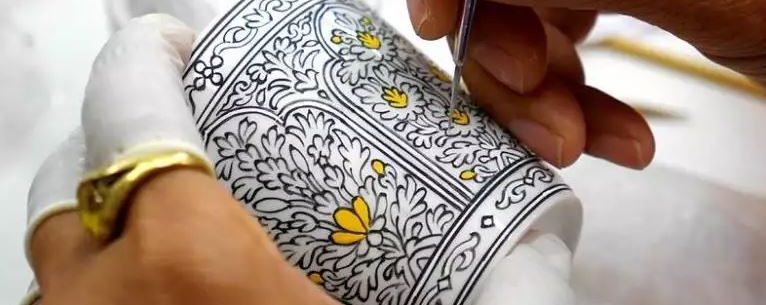Banyak yang beranggapan bahwa daya tarik utama wisata Thailand adalah pantai dan juga laut, memang hal ini tidak salah, tetapi tidak sepenuhnya benar juga. Pasalnya ada banyak tempat di Thailand yang indah dan otentik yang tidak berhubungan dengan laut dan

Melihat Koleksi 50.000 Jenis Mainan Di Batcat Museum Bangkok
Museum biasanya berisikan benda-benda bersejarah yang sudah kuno, namun bagaimana jadinya jika museum tersebut berisikan 50.000 lebih jenis mainan ? Jika kalian seorang pecinta mainan, maka kalian perlu datang ke Batcat Museum yang ada di Bangkok. Disini kalian akan melihat

Lihat Produksi Keramik Indah Di Baan Pinsuwan Benjarong Thailand
Bagi kalian pecinta keramik, ada satu tempat yang bisa kalian kunjungi saat berlibur ke Thailand, nama tempat itu adalah Baan Pinsuwan Benjarong. Tempat ini merupakan pusat home industri yang berfokus pada pembuatan keramik. Baan Pinsuwan Benjarong terletak di Samut Songkhram

Adat Yang Perlu Kalian Pahami Saat Berlibur Ke Thailand
Dalam beberapa tahun terakhir ini, wisatawan yang datang untuk berlibur ke Thailand mengalami peningkatan yang cukup signifikan. Tidak bisa dipungkiri, Thailand memang menjadi negara yang sangat digemari oleh wisatawan, pertama karena wisata yang murah serta banyaknya destinasi wisata yang bisa

The Verona At Tub Lan - Destinasi Wisata Di Thailand Dengan Gaya Italia
Apakah kalian bosan dengan suasana yang ada di kota Bangkok saat berlibur ke Thailand ? Ingin mencoba wisata dengan suasana yang berbeda ? Sebenarnya ada banyak destinasi wisata bergaya Eropa yang ada di Thailand, hanya saja ada beberapa tempat yang

Serunya Menyaksikan Pertandingan Muay Thai Di Rajadamnern Stadium
Muay Thai merupakan seni beladiri khas Thailand yang sangat populer di dunia. Jika dulunya Muay Thai merupakan tontonan yang digemari oleh para pecinta bela diri, saat ini Muay Thai sudah mulai digemari oleh wisatawan biasa karena keseruan yang ditawarkan. Di

Chocolate Ville - Restoran Instagramable Yang Wajib Dikunjungi Di Bangkok
Kalian bingung untuk mencari restoran yang instagramable di Bangkok ? Jika kalian bingung, kalian bisa mendatangi Chocolate Ville yang terletak di Bangkok. Tempat ini merupakan restoran yang menggunakan konsep Dinning in te Park dengan arsitektur Eropa dan juga Old America.

Bosan Dengan Wisata Mainstream Di Thailand ? Coba Datang Saja Ke Khao Yai
Jika kalian merasa bosan dengan aktivitas dan kegiatan liburan di pusat kota Thailand, Bangkok, tidak ada salahnya bagi kalian untuk datang ke Khao Yai. Tempat wisata ini tidak seperti tempat wisata yang ada di Bangkok, penasaran dengan tempat ini ?

Hat Yai - Kota Perbatasan Thailand Dan Malaysia Dengan Sejuta Keindahan
Apakah kalian sudah tahu kota yang bernama Hat Yai ? Kota ini merupakan kota yang terletak di Selatan Thailand dan berbatasan langsung dengan negara Malaysia. Tempat ini dapat ditempuh menggunakan transportasi darat dengan memakan waktu selama 4 jam jika kalian

Tuk Tuk - Kendaraan Khas Thailand Yang Unik Dan Lucu
Menurut kalian, apa transportasi yang paling tepat untuk digunakan ketika berlibur ke Thailand ? Mungkin jawaban yang paling sederhana adalah taksi ataupun ojek. Memang sih kedua kendaraan tersebut masih dapat digunakan saat berlibur ke Thailand, tetapi untuk taksi sendiri, harga
